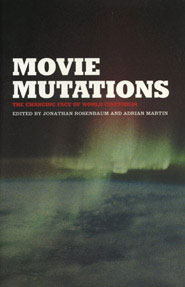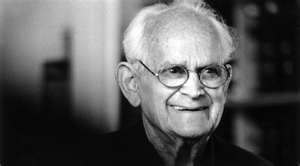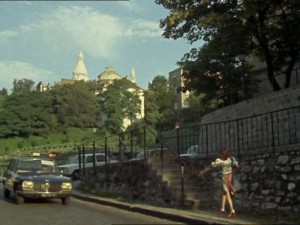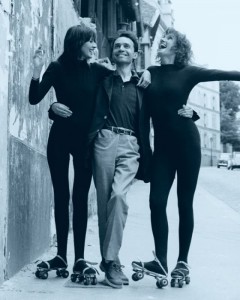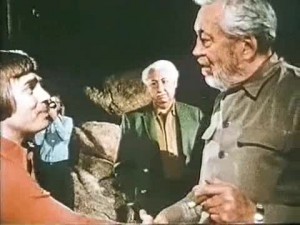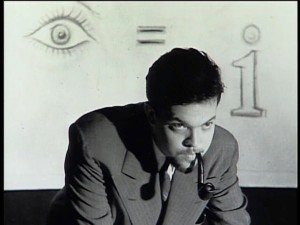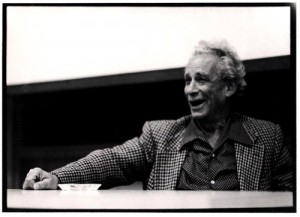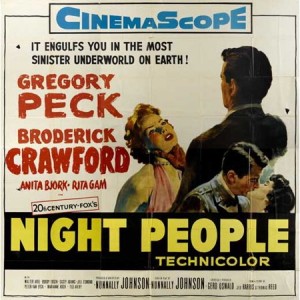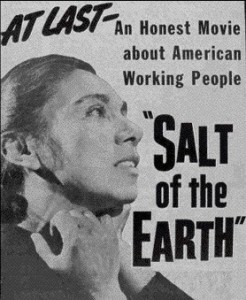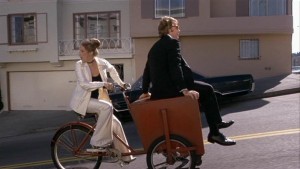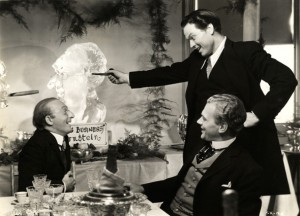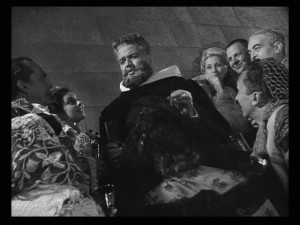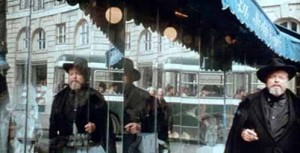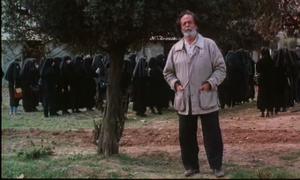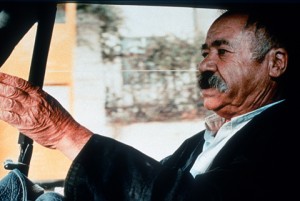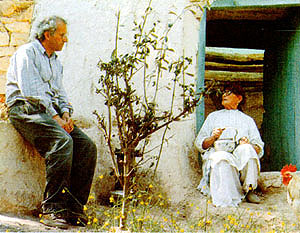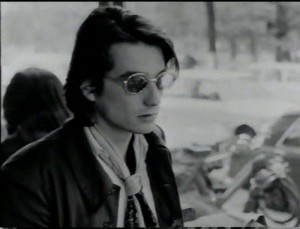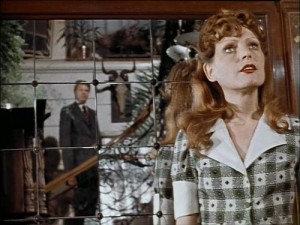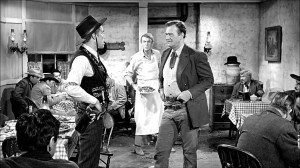The following interview took place in a hotel lobby in early February 2020. My friend Kinga Keszthelyi, who arranged my visit to Budapest, is on the left, and Simon is on the right. — J.R.
From Movie Mutations to 1968:
An Interview with Jonathan Rosenbaum in Budapest
Simon Petri-Lukács
Jonathan Rosenbaum visited Budapest earlier this year to give a lecture about Abbas Kiarostami and Orson Welles. During this special seminar, he discussed the similarities in the two filmmakers’ relations to self-criticism and the dominating presences of investigations, interrogations and unsolved mysteries in both oeuvres.
I felt great liberation when I discovered Jonathan Rosenbaum’s criticism at the end of my teenage years. The stupidity of critics I was aware of at the beginning of my cinephilia actually led me to the nonsensical conclusion that I had to become a filmmaker to speak about other people’s films in an acceptable and intellectually satisfying way. On my first encounter with Jonathan’s work, I found what I didn’t know I was seeking and it changed my attitude forever. Having said that, it’s quite obvious that I was over the moon to be able to interview him.
I have been interviewing Alexander Horwath for the last two years about several topics and my main interest was to ask Jonathan about his book, Movie Mutations. However, having been inspired by his lecture, we ended speaking about lot more, Welles, Kiarostami, and most importantly for me, the problems with conformity and choirs in film culture and society in general.
INTERVIEW
PETRI SIMON: I wanted you to talk about Movie Mutations and how the idea originated! What did you think about the form of correspondence and what did it mean to you to connect these four people?
JONATHAN ROSENBAUM: I was kind of curious about the similarities in taste between all of them. I can’t remember in what order I met them but it first took root when I recorded a dialogue with Adrian Martin when I was in Australia. I was starting to think about the similarities of their tastes, which wasn’t my taste – the kind of directors they were all interested in like Monte Hellman, John Cassavetes Abel Ferrara, Brian De Palma, Eustache and I may have included Rivette because they all had some interest in Rivette too. It was basically that curiosity to explore what created, I guess you can call it, global synchronicity. My friend, Bernard Eisenschitz, said that was a Jungian idea – the whole idea of global synchronicity, in other words, people having the same reception and ideas independently of one another across the planet. It’s still kind of interesting to me, what generational currents can make such a thing possible. Also, it was something that I thought needed to be critically formulated because I didn’t understand why they liked these filmmakers so much and I thought there must have been specific reasons. I basically wanted to learn more about what brought them together and of course what was so interesting to me was that at the time, none of them knew each other except for Alex and Kent. Now, well I was going to say that we are all friends, but Adrian has not spoken to me for quite some time now. Otherwise, we all know each other and meet once in a while.
PS: Did you have the feeling that you are an influence on them?
JR: You know, I don’t feel like I want to have disciples in the sense that Manny Farber had disciples or critics who only want to create duplicates of themselves. This is not something I want to do. I want to have an influence but I think the methodology I use is obviously not suitable for everybody to use and it would be kind of boring if everybody did the same things and wrote the same things or had the same insights. It was certainly boring to me when I took over Manny’s film criticism class in 1977 and discovered that most of his students were trying, disastrously, to write just like him.
There is no question that Nicole has been consistently one of my biggest supporters. I post two things a day on Facebook and she is often the first one to like them. I am very grateful to her and I actually feel that these are people whom I turn to when I want to read interesting criticism. I do value them all as critics. There are other people whom I value as critics even when I disagree with them. You know, Hoberman I feel further and further apart from, but he writes for the mainstream and I’ve come to feel more and more that I am somebody who has never been in the mainstream and does not really belong there. The way I come to perceive this is that if you are a member of the mainstream, you don’t get to brand yourself–the mainstream brands you. But if you’re not in the mainstream, you can brand yourself. And so I’ve decided to do that. In fact, it’s partly the declaration of my last two books that I consider myself an artist at least as much as Manny Farber was an artist when he wrote criticism. He saw criticism as an art form and writing as an art form and I even prefer being treated as pretentious and belonging to what they call in London the Pseuds Corner, a feature in the magazine Private Eye where they reprint statements they find overblown and pretentious. I prefer that to being considered a parasite who just exists in order to promote movies that come out, which is what I think, at least in American culture, criticism is supposed to be. That’s what Pauline Kael is supposed to be when they talk about her as the greatest film critic who ever lived. If the idea, the whole point of being a film critic, is to promote and advertise, then maybe you can argue that. But Manny Farber, as far as I know, never wound up being quoted in any advertising blurb, and to me, part of his greatness has to do with the fact that sometimes you can’t even tell whether he liked the film or not.
PS: Your famous claim comes to mind that probably the most influential American critic was Harvey Weinstein if this is how you understand criticism…
JR: Yeah, that’s right. Certainly, he was the New York Times’ favorite film critic and in a way he still is. In all the pieces you can read there about Harvey Weinstein you find not a word about his artistic crimes.
PS: I think Schrader brought it up on Facebook.
JR: What did he say?
PS: He commented how Weinstein and Miramax treated Wong Kar-Wai.
JR: Oh, right. He also wanted to recut Jim Jarmusch’s Dead Man and when he couldn’t he basically made sure that it would fail commercially in the United States. The incredible thing is that Janet Maslin said, when I talked to her about it, that he should have let Harvey Weinstein recut it, it would have been a better movie probably. That was the way she thought about it. That proves to me that he was her favorite film critic, she thought that his opinion mattered more than mine or anybody else’s. People were just asking me why there is all this excitement about what seems to be a very average film, not a bad film but not a particularly exceptional film, Parasite. It must have something to do with the ad campaign or the promoters. Of course, it deals with you know class differences in an upfront way, but even for dealing with class I think Snowpiercer is a better film. But you know, most of the things that get people excited in the mainstream mean nothing or very little to me.
PS: This is I think a very important element in the singularity of your criticism — how you point out the banalities of, for the lack of a better word, arthouse films. This is exemplary of that uncompromised attitude, how you relate to Parasite and how you differentiate its actual importance and its presentation.
JR: Yeah. It actually makes me curious. What I really can’t understand is why people love it so much. Or if they do love it or it’s just that they’re responding to the ad campaigns. I’m convinced that ad campaigns and pressbooks play an enormous role. I had the experience of trying to read every review of Nixon when it came out and I never found one that didn’t use the word “Shakespearian”. Then I thought, well, it was in the pressbook, that’s where they got it from. That to me is kind of frightening when you think about it, that kind of uniformity. I had the experience when I was living in London and there was a distributor called Contemporary Films that said they were willing to distribute Céline et Julie vont en bateau, the Rivette film, if I did the pressbook for free, and I agreed. After doing the pressbook I was amazed when I started reading the reviews that even the people who hated the film copied things out of my pressbook. I am not trying to say that I am totally exempt from this. When you have to write about a film and there has been hardly any press about it, you have to write whatever the press release says. Sometimes that’s the only thing, so you use that as a starting point. Even so, when it gets to inflecting the critical reading of something, that’s when it becomes a little more sinister, I think.
PS: Don’t you see it as a continuous phenomenon, that every year the mainstream picks out an arthouse film, let’s say, and starts overly championing it and even more so if the film has an acceptable and unchallenging Marxist agenda on the basis of which they can refer to their own progressive side? Maybe it helps to clarify what I mean if I refer to your article “En movimiento: Placeless Identity”, in which you write that Pawlikowski, Cuarón and others are accorded the status of honorary Americans. And this usually happens at the expense of more complex films.
JR: It’s true, in fact I have to say that I actually many years ago quit the Chicago Film Critics organization which I belonged to. The reason why I quit them is that I actually decided that the public had better taste than they did. Because they would only see two or three foreign films a year and then one of those three they would pick out as the best foreign film. For the public, the best foreign film would be different. In the same way, compare the ten-best-lists of the New York Times or Film Comment or the Chicago Reader or Sight and Sound with Roger Koza’s extensive poll at http://www.conlosojosabiertos.com/where Vitalina Varela became the best film of the year, getting I think eight more votes than the Tarantino film. And of course, the Costa film barely existed at all on the other lists. You could say that there is as much uniformity within our persuasion as it is between the persuasion of the others. You know, that we all love Vitalina Varela and they all love the Tarantino movie or whatever and it seems to me strange that there is this uniformity and maybe it is not so good. Even though I am glad other people like Vitalina Varela, I am sure there are a lot of important films out there that are still not getting recognized and may take years before we wind up seeing them or hearing about them. It drives me crazy when a critic says that such and such was a good year or a bad year, you know, which still happens. The whole ideology that the only films that exist are the ones that are released with multimillion-dollar ad campaigns is still very operative.
It also operates in other ways. I’m convinced that one thing that really harmed the reception of The Other Side of the Wind is that it was handled by people who didn’t really understand it. Not to say that I understand it, but I think I understand why their approach was wrong and why the documentary about it, you know which leads people to think that the dialogues were improvised, for example, is misguided. Part of this has to do with the fact that the mainstream position about Orson Welles in the United States, maybe not elsewhere, is that he was crazy, you know: Crazy Welles. That’s the approach they had to take in the documentary about The Other Side of the Wind. And not that he was being, in relationship to his own art, methodical or reasonable or anything like that, it has to be the crazy, outrageous Welles. That’s really what people are happier with. It’s their substitute for a critical reading.
PS: I think at least in Central Europe the great misunderstanding with Welles is that many see him in a very similar way to John Ford or Minnelli or Hitchcock, as someone who operated within the system as an auteur but the very obvious fact that he even left the US and started to make films in Europe is absolutely neglected just because of this obsession with a simplifying classification that seems impossible to overcome.
JR: I know. What fascinates me is that Kubrick and Welles released the same number of features, and actually now if you count The Other Side of the Wind, Welles released one more than Kubrick. And they both ended their careers in exile. And yet everybody considers Kubrick a success, and in America Welles is considered a failure. Now why is that? It’s because stupid millionaires and billionaires didn’t make more money from his work. Why should we care about that? You see, that’s how so omnipresent the ideology is about Hollywood taking over everyone’s values and films are judged accordingly. And you know, as I’ve said, nobody reproaches Kafka because he didn’t finish everything. People don’t see him as a failed writer the way they see Welles as a failed filmmaker.
PS: Actually, one way along which I wanted to connect Welles and Movie Mutations is to ask you if you think that the public or critics or curators relate differently to Welles, Chaplin, von Stroheim or Tati than let’s say to Nanni Moretti or Pialat or Cassavetes and how the director is the star of his or her own film? Did the reception of the phenomenon of a filmmaker consequently starring him- or herself, which is not true for Pialat but true for others who have important role in the Movie Mutations correspondence, change after a general understanding of auteurism became dominant? Was Welles or Chaplin understood differently in that regard?
JR: That’s interesting. I haven’t thought about that as much as I should. I’ve thought about it in connection with somebody like Elaine May and you can talk about Sam Fuller too. It does seem to me that when you have writer-director-stars, what’s most neglected always is the writer part. People don’t think about von Stroheim as a writer, they don’t think of Welles as a writer and so on. Albert Brooks is another case, you know. I am not sure about Pialat. He does act in some of his films but I haven’t even thought about this and I might put him into a different category. It is true that Welles and Cassavetes had a lot of admiration for each other. I find it very interesting that Fuller had a very original approach to acting. His role in other people’s films as an actor was as a script doctor. Whatever holes they had in the script, he would create a character designed to fill up the holes, which is really kind of interesting.
You see, that’s the funny thing, that there is always a connection in the theater between being a writer and being an actor. Shakespeare was an actor. Somehow the writing part has always been neglected in Hollywood, it’s always the thing that’s minimized and not paid attention to. That’s I suppose one way Pauline Kael could be valuable, maybe Manny Farber too, even more so, namely showing how acting can be a kind of writing itself. That Cagney wrote his character so to speak, for example.
PS: During the lecture, I asked you about Pauline Kael and Orson Welles and why you wrote that F for Fake was a response to “Raising Kane“. The reason I asked you that was because I wanted to know if you think Kael had political agendas against Welles. Because Thom Andersen told me that he thinks the reason for Kael neglecting many filmmakers was political and that she was right-wing.
JR: Well, it is true that one of her earliest pieces which she was sort of celebrated for was called something like “Fantasies of the Left and Right”, in which she wrote about Night People and Salt of the Earth. Treating those two films as equivalents was bad enough, but also, I got to know Paul Jarrico, the producer of Salt of the Earth, and he told me that Pauline Kael, in her attack, quoted scenes from the script that weren’t in the film. It even raised the possibility that maybe she hadn’t even seen the film, that she could have written the whole critique without having seen it.
The great methodology that right-wing critics have, protecting themselves, in America is to claim that they are not political at all, to claim that they are neutral. It is true that Pauline Kael attacked Roger & Me, the Michael Moore film, and General Motors used her attack in their own propaganda. They sent out her review to shareholders, which was amazing. In fact, the way she used another critic, Harlan Jacobson, became part of her own right-wing attack. You see, I think there is a lot of political innocence in America, when people don’t even think they are being right-wing when they are being right-wing. The perfect example of that is the reaction to the Tarantino film. Part of my resistance even to John Ford, which I’ve overcome to a certain extent, has to do with the fact that he was taken by many cinephiles in a right-wing way not in a left-wing way. I think he could be taken both ways. I think what Peter Bogdanovich says in Directed by John Ford, that American history courses should show John Ford films, implicitly presents him in a right-wing fashion. Peter Bogdanovich is not seen as a right-wing person but if you look at for example What’s Up, Doc?, many of the gags he has taken from silent slapstick – which in silent slapstick are usually ridiculing and making fun of stuffy upper-class people – are humiliating or frustrating various working-class people who are just doing their jobs. I don’t think Peter was thinking of that in a political way but it does have a political impact and it’s why I’ve always disliked that film. I think that one can come away from Nickelodeon feeling that for Peter Bogdanovich the main thing that was important about the Civil War was that D.W. Griffith would make a movie about it.
You know, nostalgia tends to be a right-wing emotion. I say that even when I’m being nostalgic myself. The whole idea of “Make America great again” is based on that idea. The reason why Joe Biden polls more highly than all the other opponents of Trump is because that’s looking backwards with nostalgia at Obama. It’s not even desirable to look forward so much, which I find depressing. I can understand in large parts of the world people being afraid right now because of economic things but so many Americans that I know don’t have reasons to be all that afraid. Obviously, there are plenty of people who are legitimately hurting economically now, but there are also those who are not, and I can’t think of any excuse for supporting the right-wing now except for rich people wanting to become richer. Anyway, it’s a very upsetting time because it seems to me that even the left is part of the disease. For example, Rachel Maddow, someone I’ve admired in the past, reminds me of the Ed Sullivan Show when she says, “We have a big show tonight!”. Of course, it would be inconceivable for her to say she had a small show. So she says “we have a big show” every single night. She is so happy that Trump has come up with a new outrage so that she can have fun talking about it on her show. It’s true that Trump might be terrible for the world, and not just the United States, but he is supposedly “good for television” or at least good for the advertisers on television. I don’t even know what that means, “good for television.”
Anyway, capitalism is not a victimless crime, and we are its victims. I think it’s also frightening that people now feel that they have to belong to groups and I include myself in that. I call my group the people who go to my website, which I track every day. Even though it’s an unofficial group, I still consider it a group and I feel more secure being a member of my group. Maybe that’s something that shouldn’t be so predominant now. Because it seems to me that it’s what leads to some of the conformity that we’ve been talking about.
PS: If a group is not entirely unfragmented or entirely homogeneous then it’s very different. Since I also count myself among your most devoted readers, what I see are often debates…
JR: It is true, it can be debated. Part of the problem with mainstream culture, even including things like #metoo, is that things are not debated. Nobody is willing to consider anything Roman Polanski has done or might have done since he raped a teenage girl and that dismissal is a problem.
PS: You write about that in your article — the catastrophe of public discourse. One thing I see in common between Welles or Kiarostami and the filmmakers mentioned in Movie Mutations — Cassavetes, Moretti again, or even Garrel — is how they cross-index their own films and create through-lines in their oeuvres, that they give hints for critics to look at their films in particular ways.
JR: I don’t think Welles liked to do that. Kiarostami may have… I don’t think Welles was happy with the way his films were read. Because he liked to think that his films were different and not similar to each other.
PS: But don’t you think that the dialogue between Citizen Kane and Mr. Arkadin is intentional? Or the references to the hall of mirrors in F for Fake?
JR: No, I guess you’re right about that. I’m sure that at least some of it must have been intentional. But on the other hand, he got tired of people talking about “typical Wellesian shots”, so he said in his interview with Bill Krohn that when he was making F for Fake, he wanted to make a film in which there are no typical Wellesian shots. And there are a few but not very many in F for Fake. When his black cape covers the whole screen, that’s like a typical Wellesian shot, used as a transitional device. Also, Welles wanted to surprise himself — it wasn’t just that he wanted to surprise audiences — and I think that’s true of Kubrick also. That’s why Kubrick shot so many takes, not knowing what he wanted, at least that’s my sense of it. He didn’t like to give interviews because he didn’t like to define what he was doing.
PS: And what do you think of Welles as the performer? His voice, his bass is so unmistakable, the way he addresses the audience at the beginning and at the end of The Trial, for example, is so essential. And even in films by others, like History of the World, Part I. What do you think of his performative presence?
JR: Well, it’s really funny because it’s the voice of God basically. And I think what he does as a filmmaker, as a director, as a writer is to question the voice of God, constantly, it’s nothing but questioning it. When I met him, he actually insisted that his idea to play both Marlow and Kurtz in Heart of Darkness was very much a last-minute decision, because he hadn’t found anybody else to play Kurtz, but he didn’t want to play him. Whereas everybody thinks that well, of course he wanted to play Kurtz, because of the whole idea of Welles being the autocritic of his own megalomania, and so on. I was saying to someone today that I like Through the Olive Trees less than other Kiarostami films because I don’t think it’s critical enough of the director in that film. That the director is too much like Santa Claus, this wise old man. He is very kind and somehow it just seems to me that there is something a little more sinister about that figure in Kiarostami’s other films, even including himself. Maybe I’m wrong, as it was pointed out to me, to always see him in that way and see that as his only intention in Through the Olive Trees. Maybe there are other things going on that I’m less sensitive to. I do tend to dislike the moments when he has wise old men turn up in his movies. Even the Turkish taxidermist in Taste of Cherry, although I guess he is more bearable than the others.
PS: The director figure is not very sinister in …and Life Goes On, either.
JR: Oh no, he is not sinister. It’s true, he is not being that critical but at the same time he is showing you that the boy, his son has resources that he doesn’t have. And it becomes an implied critique in that sense.
PS: One thing I was very curious about Movie Mutations is, how is your relation to 1968 different from that of the four younger people, the four kids of the Sixties?
JR: Well, I think it’s a different relation to the Sixties, period. Because I see the Sixties, still, as being successful in certain ways. Again, it’s the question of failure or success. I see it as success in terms of some of the things that were accomplished in relation to civil rights. It was misguided in gender politics and certain other things but it was very liberating to me. It was the only time in my life when I felt a kinship with people of my own generation. Because before the Sixties I didn’t feel it and I didn’t feel it afterwards either. Somehow there was a sense of community with the counterculture that I valued.
PS: I’m aware of your criticism about Garrel and Les Amants Réguliers and I’m also interested in how you see Fassbinder. Alexander Horwath described Fassbinder to me as a rare and late example of someone who believed in the continuing existence of a left-wing populism. I was wondering how your relation to that was formed.
JR: Well, I question some of Fassbinder’s leftism, partly because I don’t think a leftist agenda and a sadomasochistic agenda are compatible. I think there is a conflict. And when there is a conflict, it’s always the sadomasochism that wins, not the leftism that wins.
PS: And Garrel?
JR: Well, I see Garrel as a narcissist. Which is also true of Eustache, they make films about their own narcissism. I consider Eustache right-wing and I have argued that. But I don’t think most other people would see him that way. I think he is defeatist. That’s part of my critique of Fassbinder also. One way I can define what I find right-wing about Fassbinder is what he has in common with Lars von Trier. There was a collection called Unwatchable and I contributed something to it about why I refused to watch Antichrist. I quoted something from Lars von Trier when he said, supposedly putting down Trump, that he actually enjoys his hatred of Trump so much that it kind of becomes a positive thing about Trump. And it seems to me that Fassbinder loves stupidity. He also loves people suffering. I find it hard to reconcile that with him being leftist. Because I don’t see him paving a road towards a happier future for anybody. Maybe it depends on what you make out of it and I guess there are different things you can make out of his critique. I’m not trying to say his critique was wrong necessarily about certain things, he might have even been right. But at the same time, in the same kind of way there are certain things that are stable in the mainstream and modern culture, like the characters in comic strips. They can’t ever change because if they changed, they wouldn’t be valued anymore, at least not in the same way. And if the characters are incapable of change, then that becomes conservative.
One reason I make an exception with Fassbinder, especially with Martha, is because Martha is a challenge to the audience, saying okay, if this is what you accept, then this is how ridiculous it is, what you accept as normal. His aggression is aimed at the audience in a certain way, not just towards the character of Martha. And maybe one could make that sort of argument with some of the other films. There are ones I enjoy, certainly.
PS: What’s your relation to the American left?
JR: Part of the trouble with the American left for me is that it tends to be philistine. That might even be true of people whom I admire, Robert Kramer for example. When I saw Ice, I originally thought that was a devastating critique of the left, but I’m not entirely sure it was intended as a critique. In other words, maybe he was just exposing things about himself. There is an awful lot of his work that’s very rigid and not inquisitive.
One thing that struck me as strange about David Walsh at the World Socialist Web Site, when he interviewed me about my last two books, was the fact that he couldn’t accept either Béla Tarr or Pedro Costa. Because he thought that they were politically incorrect at some level. They didn’t have the right, proper form of Trotskyite-Marxist analysis. But plenty of the other filmmakers he likes don’t have that analysis and he doesn’t reject them, so I’m puzzled
PS: Do you like Olaf Möller’s work?
JR: Sometimes. But I do think he tends to be too politically correct. There’s a lot I’ve learnt from his writing. He was one of the people who taught me how to love Paul Verhoeven. I think he is a very important and useful critic.
PS: It just came to my mind that he famously denounced uniformly celebrated filmmakers like Moretti and Kiarostami because his politics don’t conform with them.
JR: Straub saw a film by Kiarostami and put it down to Pedro Costa, saying it’s a film of a tourist. I thought, wait a minute: Straub loves Tati and Tati’s films are all the films of a tourist. What’s wrong with that? It would be interesting to have an argument with Straub about it, although it’s usually impossible to have an argument with him. Whatever his position, he kind of sticks to it and doesn’t really interrogate it, once he arrives at it. He wrote something once to say how much he loved John Ford but he hated The Man Who Shot Liberty Valance, and when I first met him, I asked him, why did you hate that film?, and he couldn’t explain. And then, many years later, he told me he didn’t hate it anymore. But he never explained why.


